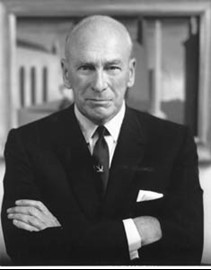George Abbott
Broadway Actor, Director, Playwright

1887 - 1995
Inducted in 1993
Biography
Pulitzer Prize-winning director and Broadway legend George Abbott produced, wrote and directed such a long list of acclaimed shows that long before he died, at age 107, he was known around the world as "Mr. Broadway." Abbott set an astonishing record at the highest level of popular theater, staging 27 musicals and dozens of other productions over a 27-year span. Twenty-two of his musicals were memorable hits, including Damn Yankees and The Pajama Game.
George Francis Abbott was born in 1887 in Forestville, New York, a tiny village near the coast of Lake Erie. His father served two terms as mayor of the nearby town of Salamanca. When Abbott was 2, the company his father ran—a uniform-making business—went bankrupt and the family moved to Cheyenne, Wyoming where his father found work as a federal land agent. Abbott thus grew up learning the skills and habits of cowboys, experience that would serve him well later in his career.
In his teens, his family moved back to New York, settling in Hamburg, a small town not far from where Abbott was born. At Hamburg High School, Abbott played football and other sports, graduating in 1907. Four years later, he graduated from the University of Rochester, where he joined an acting club and wrote his first play, Perfectly Harmless.
He left Rochester for Harvard to study playwriting and became active in the Harvard Dramatic Club. While a student, he got his first taste of success as a playwright, winning $100 in a contest sponsored by the Bijou Theatre of Boston. In 1912, the company produced his winning one-act play The Man in the Manhole and then hired him as assistant manager.
Abbott spent a year in Boston before heading to Manhattan, determined—at age 19—to gain a foothold on Broadway. He scored initial success, making his Broadway debut with a role in a hit play, The Misleading Lady. But that success opened few other Broadway doors, and Abbott struggled to find work. Finally, in 1918 he was hired as an assistant to a small-time theater producer, a job that led to his first real break in professional theater. In 1923, he drew on his youthful exposure to cowboy life to color a role as a cowboy in a hit play Zander the Great. Critics judged Abbott's acting as one of the 10 best performances in New York that year.
But Abbott soon began to shift his focus from acting to writing. In 1925, The Fall Guy, a play he co-wrote with James Gleason, was a modest success. The following year, Abbott teamed up with another playwright, Philip Dunning, for his first major hit, Broadway, which ran 603 consecutive nights. Abbott had finally found his footing as a serious playwright and Broadway had found one of greatest showmen in its history.
For the next four decades, it would be the rare year when Broadway did not feature a play written, directed or produced by George Abbott. Hollywood also bore his stamp, beginning in 1930 with the release of All Quiet on the Western Front. Abbott collaborated on the screenplay, and the film won two Oscars including Best Picture and Best Director. Despite his promise as a Hollywood production star, Abbott chose to focus all his energies on the stage. In doing so, he transformed American theater with a gifted touch.
The long list of Abbott's productions (estimated at roughly 120 titles) includes some of the most popular plays in the history of modern theater. Early hits included Jumbo (1935); Too Many Girls (1939); Pal Joey (1940); On The Town (1944) and Where's Charley? (1948). Abbott's unprecedented run of hits continued through the 1950s, a glamorous streak highlighted by The Pajama Game (1954), Damn Yankees (1955) and Fiorello! (a musical based on the dramatic life of former New York mayor Fiorello LaGuardia). For his directorship (and co-authorship) of Fiorello!, Abbott won the Pulitzer Prize for Drama in 1960.
Theater historians credit Abbott with revolutionizing American theater. He was the first artist to produce Broadway musicals that were serious dramas. His hallmark contributions included rapid-fire pacing, tight scripts and an eagerness to help young, unknown talent reach their potential. Abbott's most famous protégés included actors Helen Hayes, Gene Kelley, Eddie Albert, Shirley MacLaine, Lucille Ball, Van Johnson, Gwen Verdon and Carol Burnett along with dance, writing and musical artists Leonard Bernstein, Bob Fosse, Harold Prince and Jerome Robbins.
Known for his remarkable stamina and drive, in 1987 Abbott marked his 100th birthday in Broadway as director of a revival of his first big hit, Broadway, which debuted in 1926. Abbott called Miami Beach home for more than 30 years, dying in 1995 (at age 107) as one of the undisputed—and most decorated—titans of American theater. At the news of his passing, Broadway dimmed all its lights in his honor.
Related Links
- Broadway website - http://www.broadway.com/

